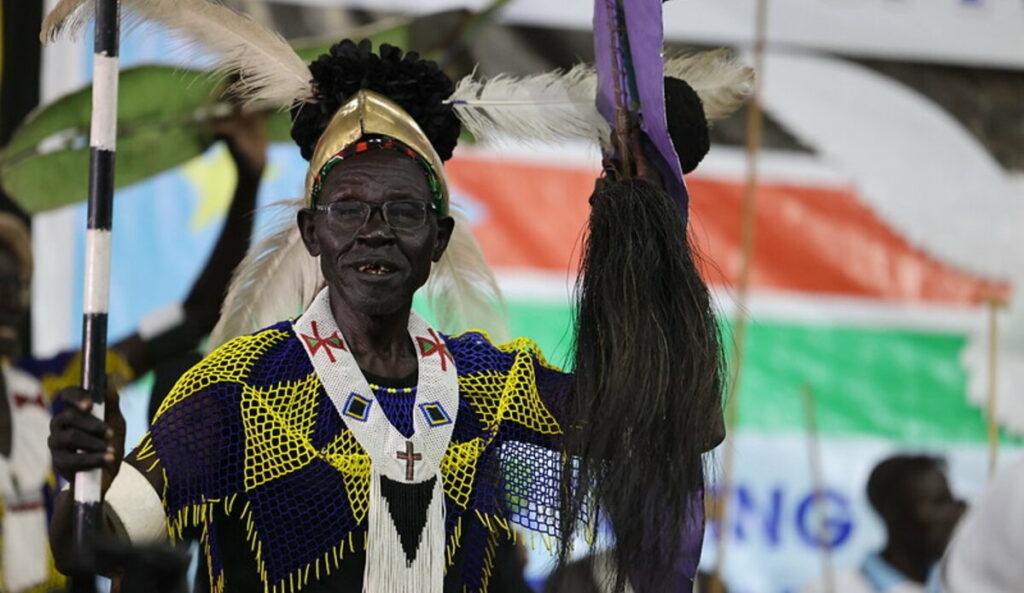
JUBA, South Sudan, 23 September 2024 -/African Media Agency(AMA)/- While the cultural diversity of South Sudan was on show through the vibrant and energetic performances of multiple ethnic groups at an International Peace Day event in Juba, it was the collective desire for peace, democracy and a brighter future that attracted most attention.
Nineteen-year-old performer, Everlyne Batista, described her participation as an opportunity to put the trauma of conflict behind her and embrace feelings of unity and hope.
“With peace, I can go to school, I can live without the stress I had before, including losing my relatives. That is the good news of the peace that I am enjoying now, even though everything is not all well. I want peace in South Sudan.”
Politics dominated discussions among the country’s leaders, civil society, and international peace partners at the event, particularly the extension of the transitional period of the government and postponement of elections for further two years.
Wearing a hat with the slogan, ‘peace is a right not a privilege’, civil society representative Edmund Yakani gave a fiery speech about the impact of the decision on the people of South Sudan.
“Unfortunately, we have seen our political leaders, and their various political establishments tend to treat peace for us as a privilege,” he said.
“Peace is not the responsibility for politicians to use it and keep us suffering in this economic crisis that we are in,” he said to applause from the crowd. “You have the responsibility, as our leaders, to make peace prevail in this country.”
“We are not suffering because peace requires the presence of donors. We are suffering because we need political leaders to say enough is enough to violence. Why are they spending millions of dollars to fight and buy guns, why can we not spend millions of dollars on ensuring the peace agreement is delivered?” said Edmund Yakani, from the Community Empowerment for Progress Organization.
The representative of the European Union described why it had not supported a resolution to extend the transitional period at a recent meeting between political leaders and peace partners.
“We all want the country to go for elections, but we want to see elections that are peaceful, above all, transparent, free, fair and inclusive. When we evaluated, we found that this is not going to be possible,” explained keynote speaker, First Vice President, Dr. Riek Machar Teny, citing numerous reasons for the extension, including the need to finalize the unification of forces, ensure the return of millions of South Sudanese refugees, resolve intercommunal conflict, determine the governance system, and agree on a permanent constitution.
“These are the reasons why we decided it is best to extend for a period of 24 months. It is not for being in power. Many of us want to see the people of South Sudan elect their leaders but in an environment which is conducive for them to exercise their right. If we drive them into an election which is not conducive, in the end, we will be blamed for this because we know our people.”
The First Vice President pointed to the challenges facing the country, including the spillover of the Sudan conflict and a lack of revenue. He repeatedly stressed that financial support will be needed to implement the peace agreement and deliver elections.
On behalf of the Troika (Norway, the United Kingdom and United States), the United Kingdom Ambassador, Guy Warrington, expressed deep disappointment and frustration at the persistent failure to implement key benchmarks in the agreement, despite the international community providing significant financial and other support for many years.
“Peace remains our priority. It drives everything we do,” he said. “We, the Troika, remain convinced that peace can best be secured through legitimate and peaceful elections and that South Sudan’s leaders bear a collective responsibility to act with urgency to create the necessary conditions for such elections to take place.”
The Special Representative of the Secretary-General and Head of the United Nations Mission in South Sudan, Nicholas Haysom, pointed to this year’s theme: “Nurturing a culture of peace: our collective responsibility” as particularly relevant to the current situation.
“This theme reminds us that peace can only be achieved or secured together and it can only be sustained when there is a political will, a common purpose and shared aspirations. In my view, South Sudan still has some work to do to develop those shared ambitions to cherish its collective aspirations,” he said.
“While this means that the people of this country are, yet again, being asked to show their patience in waiting for the long-promised peace and democracy benchmarks, this development does recognize the risk of renewed conflict, and the political vacuum caused as a result of the want of electoral preparations,” said Mr. Haysom. “But it also allows further opportunity for nation building and we recognize that the mountain that must still be climbed is steep. Urgency is required. Not a pause.”
Acting Minister of Peacebuilding, Losuba Wongo, acknowledged the collective responsibility for peace.
“Every individual has a role to play in nurturing peace in our communities and our hearts. Every act of kindness, every effort to understand each other and every dialogue brings us closer to lasting peace,” he said. “We have endured too much hardship, displacement and loss of life, yet amongst those challenges, we have demonstrated incredible strength and unity. Peace is not merely a dream; it can be achieved together”
Distributed by African Media Agency (AMA) on behalf of UNMISS.

